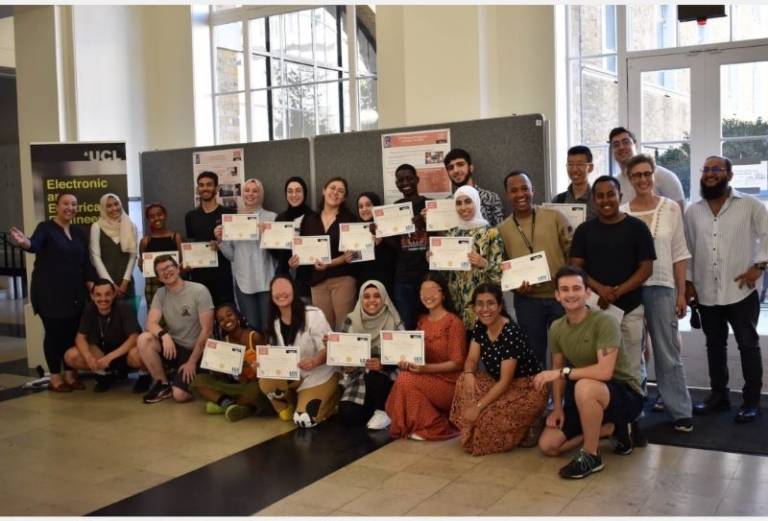A summer of STEM!
1 September 2022
A group of young refugees, migrants and asylum seekers attended a summer school organised by PhD students and UCL staff, experiencing the joy of scientific discovery and expanding their English.

PhD students and postdocs from the London Centre of Nanotechnology (LCN) and teachers from the Institute of Education (IoE) hosted a two-week summer school at UCL.
Co-sponsored by the Department of Electronic and Electrical Engineering (EEE) and the London Centre for Nanotechnology (LCN), the programme aimed to help the students to improve their science, computing and English language knowledge, helping them build vital skills and inspiring them for the future.
Organisation of the event was led by Jack Brierley (LCN), Adila Islam (LCN), Eva Aw (UCL Physics), Hector Lancaster (UCL Physics) and Guillermo Herrera Sanchez (LCN). Building on the success of the pilot event in 2018, summer school in 2019 and more recently an online mentorship scheme in 2021, the team delivered a two-week programme (teaching 10am–4pm) for 20 students, keen to expand their knowledge in STEM subjects.
To introduce the students to the basics of computing and robotics, we teamed up with George Walker who supplied some OhBots!, the official teaching robot of Microsoft.
During the experimental science lessons, led by postgraduate students and academics at UCL, the students assembled DIY microscopes (Massimiliano Ramsay), searched for the most cost effective metal/fruit combinations to make batteries (Hector Lancaster); they explored the wave-particle duality of light (Benjamin Miller and Michael Thomas) and extracted DNA from exotic fruits (Guillermo Herrera Sanchez). The students were fascinated by the detail they could resolve with the microscopes and excitedly showed off their work in a best image competition. They were also awarded for their creativity in generating the most consistent fruit battery by trading resources between groups and learning about many other facets of battery science.
During the two weeks, students gained confidence in speaking and writing English. They were highly engaged in every lesson and were particularly inspired by the experimental science and programming classes.
Finally, the summer school hosted an end-of-class celebration with posters prepared by all the students presenting their favourite topics from the science classes to PhD students, teachers, funders and even some passers-by. The students were all extremely enthusiastic presenting their posters, having had a lesson in the morning on improving their presentation skills, hosted by Lara from the LegalAliens Theatre.
From the bold and confident presentations the students delivered, the impact of the theatre session was apparent. The celebration proceeded with snacks and a certificate ceremony, as well as prizes for the top three presentations, which went to the posters titled: ‘Is Maths really perfect?’, ‘Why does colour blindness affect less Women than Men?’ and ‘Augmented Reality’.
Feedback from students on the summer school was extremely positive, including this from Reyhan Gultekin:
“I was nervous to join the summer school because I didn't know anyone. But I have learnt so many things and I liked the day where we learned about waves and optics. The short lecture is what I liked the most. Getting hands on experience with various experiments was great
Bridging the Future, headed by Safe Khan (UCL), Muslihah Albakri and Massimiliano Ramsay (UCL) will provide additional support to the students on the summer school, by organising a mentorship scheme to run from October 2022 – March 2023. With the help of postgraduate volunteers from UCL, students will receive academic support as well as guidance to assist them in applications to University.
About Bridging the Future
Bridging the Future work with young people from disadvantaged backgrounds, mentoring and inspiring them towards their educational and career pursuits, improving social mobility and creating new opportunities to bridge the future for all.
Organisational team: Jack Brierley (LCN), Adila Islam (LCN), Eva Aw (UCL Physics), Hector Lancaster (UCL Physics) and Guillermo Herrera Sanchez (LCN).
Session leaders: George Walker (UCL Makespace) – OhBots coding, Hector Lancaster (UCL Physics) – fruit and vegetable batteries, Massimiliano Ramsay (LCN) – lenses and microscopes, Ben Miller (LCN) with Michael Thomas (LCN) – lasers and diffraction and Guillermo Herrera Sanchez (LCN) – DNA extraction.
English team: Jumana Al-Weili (UCL IoE), Reem Ben Giaber (UCL IoE), Nidal Al-Haj Sleiman (UCL IoE), with help from Naomi Wineman (UCL IoE) and Gorkem Altunbas (IoE UCL).
Leading the programme: Safe Khan (LCN), Muslihah Albakhri (external) and Massimiliano Ramsay (LCN).
Sponsoring the programme: contributions from Andrew Fischer (LCN) and Paul McKenna (UCL EEE).
 Close
Close

